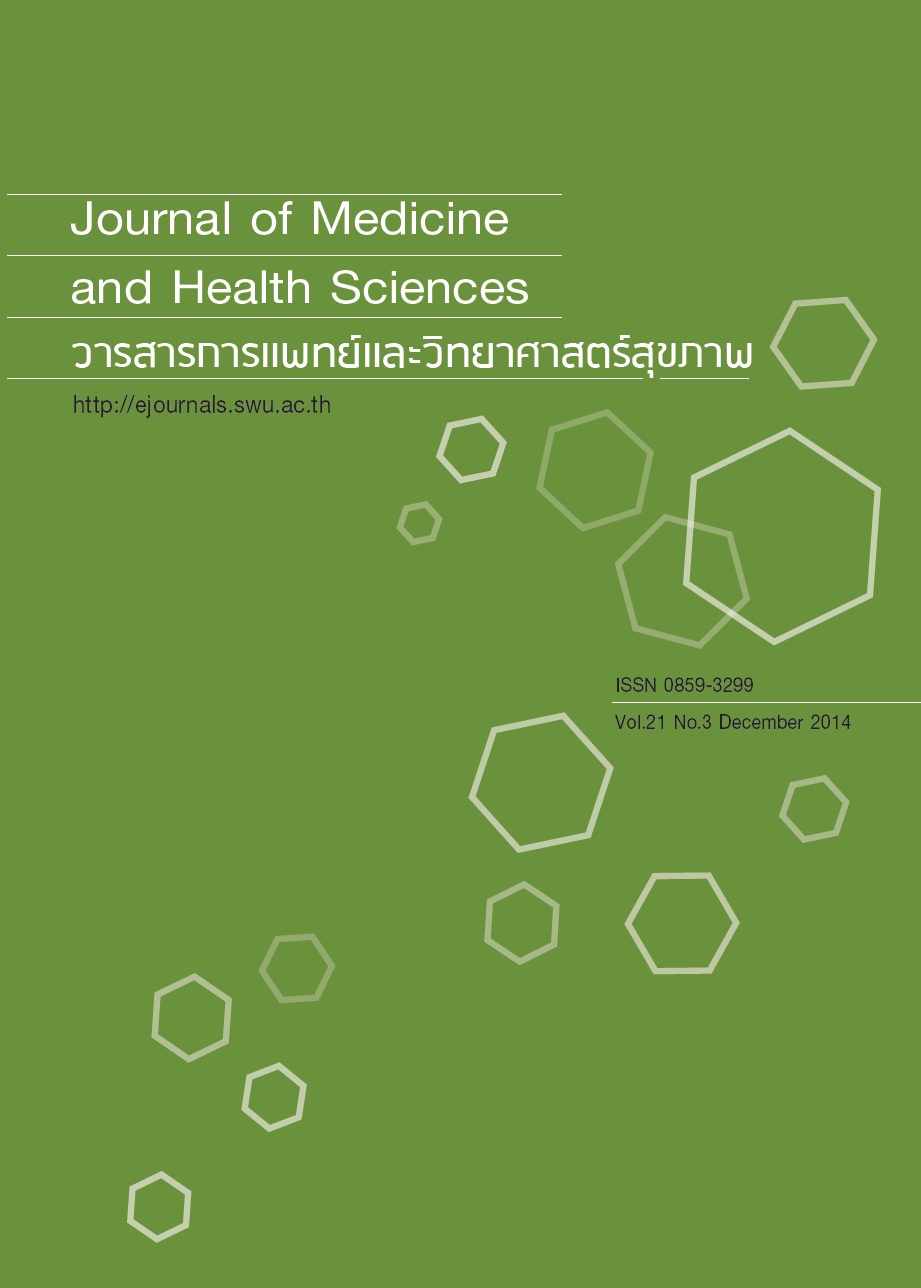Role of cytokines secreted from mast cells act on dengue hemorrhagic fever pathogenesis
Keywords:
ไซโตไคน์, แมสต์เซลล์, เยื่อบุผนังหลอดเลือด, พยาธิกำเนิด, ไข้เลือดออกเดงกี่, cytokine, mast cell, endothelial cell, pathogenesis, dengue hemorrhagic feverAbstract
Dengue infection is currently a major human health problem across the globe, especially in Thailand. The lack of an effective treatment or vaccine makes research into the pathogenesis and the development of promising important treatments. This study aimed to investigate the quantity and type of cytokines that are secreted from mast cells after dengue infection related to the pathogenesis of human vascular endothelial cells (HUVEC). The study analyzed the quantity of cytokine secretion from human mast cells (HMC-1) compared with monocytic cells (THP-1), after infection with type 2-dengue virus (DENV-2-16681) by high throughput magnetic bead-based Bio-PlexÒassay. The effect of cytokine stimulation from HMC-1 and THP-1 on the HUVEC was determined. The results showed significantly increased levels of cytokines, which were similar to those secreted from Th1 and Th2 including interleukin (IL)-5, IL-8, tumor necrosis factor (TNF)-a, macrophage inflammatory protein (MIP)-1, and granulocyte macrophage colony-stimulating factor (GM-CSF) (p<0.01). However, the study found that there was specificity between cytokine secretions and particular cell types. It was found that TNF-a secretion was higher in THP-1 cells, while IL-5 was found at higher levels in HMC-1 cells after dengue infection. The stimulation of dengue-infected HMC-1 cells on vascular endothelial cells showed a higher secretion of ICAM-1 and VCAM-1 in THP-1 cells. This study concluded that increased secretion of IL-5 from mast cells has an effect on vascular endothelial cells, which is an important step to explain the pathogenesis of dengue. This work may elucidate the role of mast cells in dengue pathogenesis to determine disease severity and development of novel treatments.
บทบาทของไซโตไคน์จากแมสต์เซลล์ ที่มีผลต่อพยาธิกำเนิดของไข้เลือดออกเดงกี่
ปัจจุบันโรคไข้เลือดออกเป็นปัญหาที่สำคัญทั้งในประเทศไทยและทั่วโลก เนื่องจากยังไม่มีการรักษาและวัคซีนที่ เฉพาะเจาะจง ดังนั้น การศึกษาวิจัยและพัฒนาการรักษาและพยาธิกำเนิดของโรค จึงเป็นการศึกษาในห้องทดลองเพื่อนำมา สนับสนุนการป้องกันและรักษาต่อไปสำหรับการวิจัยนี้มีจุดประสงค์เพื่อศึกษาบทบาทและความสัมพันธ์ของชนิดและปริมาณ ของไซโตไคน์ที่หลั่งจากแมสต์เซลล์ภายหลังกระตุ้นด้วยไวรัสเดงกี่ กับการส่งผลต่อพยาธิสภาพที่เซลล์ผนังหลอดเลือด โดย การศึกษานี้จะตรวจวิเคราะห์หาไซโตไคน์ที่หลั่งจากแมสต์เซลล์ (HMC-1) เปรียบเทียบกับโมโนไซต์ชนิด THP-1 ภายหลัง กระตุ้นด้วยไวรัสเดงกี่ไทป์ 2 (DENV-2-16681) ด้วยวิธีHigh throughput magnetic bead-based Bio-Plex® assay รวมถึงผลกระทบที่มีต่อเซลล์เยื่อบุผนังเส้นเลือด (HUVEC) จากไซโตไคน์ที่ได้จากเซลล์THP-1 และ HMC-1 ผลการศึกษา พบว่า มีการเพิ่มขึ้นของไซโตไคน์ในกลุ่มของ Th1 และ Th2 คือ interleukin (IL)-5, IL-8, tumor necrosis factor (TNF)-α, macrophage inflammatory protein (MIP)-1 และ granulocyte-macrophage colony-stimulating factor (GM-CSF) อย่างมีนัยสำคัญทางสถิติ(p<0.01) ทั้งนี้พบว่าไซโตไคน์มีความจำเพาะในเซลล์ที่ต่างกัน คือมี TNF-α สูงจากเซลล์ THP-1 และมี IL-5 สูงจากเซลล์ HMC-1 ภายหลังถูกกระตุ้นด้วยไวรัสเดงกี่ เมื่อพิจารณาดูความสัมพันธ์กับเซลล์ เยื่อบุผนังหลอดเลือด พบว่ากลุ่มที่ถูกกระตุ้นด้วยsupernatant จากเซลล์ HMC-1 จะส่งผลต่อการแสดงออกของ adhesion molecule ชนิด ICAM-1 และ VCAM-1 เด่นชัดกว่าจาก THP-1 จากผลการทดลองจะเห็นได้ว่าไซโตไคน์ที่มี IL-5 ปริมาณ สูงที่พบได้ในแมสต์เซลล์ นั้นน่าจะมีผลต่อการยึดเกาะของเซลล์เยื่อบุผนังหลอดเลือด ดังนั้น การศึกษาพยาธิกำเนิดของโรค ไข้เลือดออก จึงน่าจะพิจารณาบทบาทของแมสต์เซลล์ร่วมกับเซลล์กลุ่มอื่นๆ ที่เคยตรวจพบความสัมพันธ์มาก่อน ซึ่งผลการ ศึกษานี้อาจนำไปสู่การวิจัยต่อยอดสำหรับพยาธิกำเนิดต้นแบบของโรคไข้เลือดออก เพื่อหากลไกการเกิดความรุนแรงของโรค และพัฒนาการรักษาต่อไป



